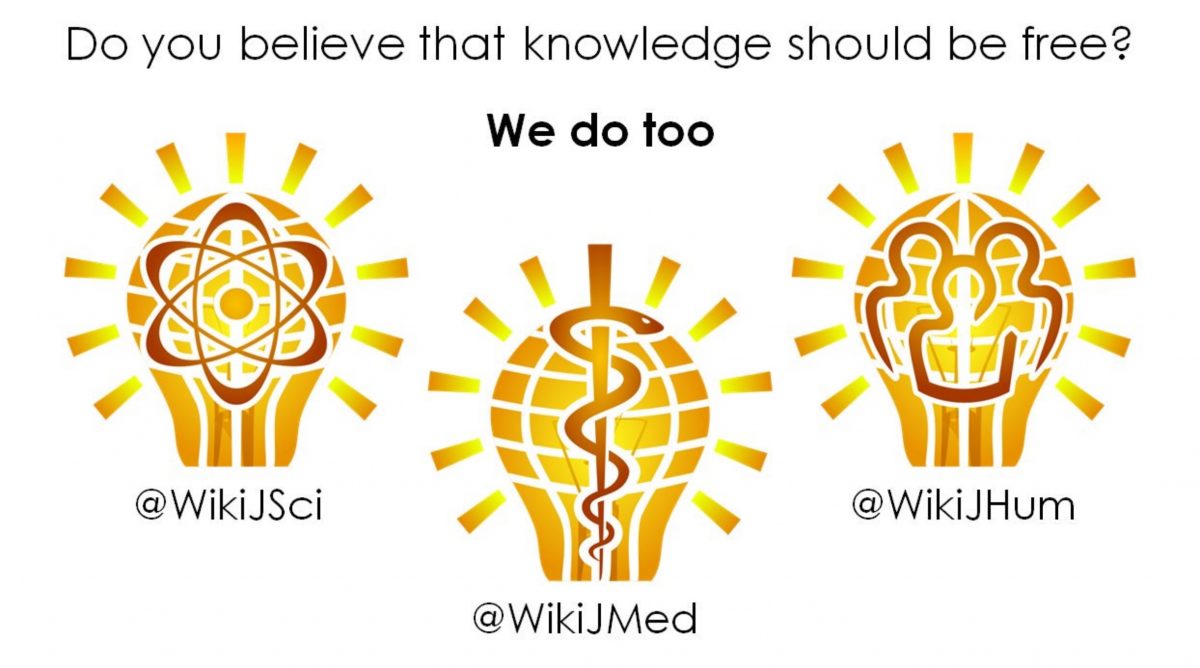
This article was jointly authored by Thomas Shafee and Jack Nunn from the WikiJournals board, and edited by John Lubbock of Wikimedia UK.
The WikiJournals are a new group of peer-reviewed, open-access academic journals which are free to publish in. The twist is that articles published in them are integrated into Wikipedia. At the moment, there are three:
- www.WikiJMed.org (the original medical journal)
- www.WikiJSci.org (science, technology, engineering and mathematics)
- www.WikiJHum.org (humanities, arts, and social sciences)
WikiJournals are also highly unusual for academic journals, as they’re free for both readers and authors!
What WikiJournals hope to achieve:
The aim of these journals is to generate new, high-quality peer-reviewed articles, which can form part of Wikipedia. As well as new articles, submissions can include existing Wikipedia pages, which are then subjected to the exact same rigour as any other submission.
The hope is that this new way of publishing peer-reviewed content will encourage academics, researchers, students and other experts to get involved in the process of creating and reviewing high-quality content for the Wikimedia project. It also allows participants a way of putting their contributions on their CV with an easily definable output (including DOI links and listing in indexes like Google Scholar).
When an article gets through the peer review process, there are two copies. The Journal copy can now be reliably cited and stays the same as a ‘version of record’ alongside the public reviewer comments. The Wikipedia version is free to evolve in the normal Wikipedia way as people update it over time, and is linked to the Journal article.
Since 2014, articles have been published on massive topics like Radiocarbon Dating and niche topics like Æthelflæd. They’ve also published meta analyses, original research, case studies, teaching material, diagrams and galleries!

How to get involved!
If this sounds like the sort of thing that you’d like to get involved in, support, or just spread the word on, there’s plenty of ways to contribute!
School projects
So here’s an example for a teacher. You have a class of 30 keen students who would normally all write an essay on a subject, have it read once, then never seen again. An alternative could be to have students in groups of 5 each chose a section of a neglected Wikipedia article to update and overhaul (there are millions of stub and start class articles to choose from). Each group writes a section of the article, then proofreads each others sections (WikiEdu has a great dashboard for this). Once the article is up to scratch, it’s submitted to the relevant WikiJournal who reaches out to experts in the topic to give in-depth feedback on what can be improved. If you and your students are able to fully address those comments then the article can be published and you and your students have just generated a new Wikipedia article read by thousands, and an academic article to put on their CVs!
Teachers who would consider using this method as an assessed class exercise can ask for advice from Wikimedia UK. We think that this workflow offers a useful alternative to simply having students write parts of Wikipedia articles in class, which may be harder to assess, and doesn’t provide a final product as tangible as a published journal article.
Academic outreach
The current priorities for the WikiJournals are to expand and improve representation on their editorial boards, and to invite article submissions. If you would like to volunteer in these roles, we encourage you to talk to the WikiJournal organisers.
If you are based in a UK academic institution at a course that has a strong strategic overlap with Wikimedia UK’s strategic priorities, you can also email education@wikimedia.org.uk to talk to us about providing advice on using WikiJournals as part of your course.
Individuals
The journals always welcome new submissions. Whether they’re written by a professor or a student, all go through the same process. You could get a team together to submit a brand new article. Or maybe you could overhaul and submit an existing Wikipedia page. You could even help translate an existing article.
They have a public discussion forum (typical for a wiki, unusual for a journal!) where you can share ideas for improvements, other projects they could reach out to or point out gaps in Wikipedia’s content where they could invite researchers to write an article.
Each journal has a twitter and facebook account (@WikiJMed, @WikiJSci and @WikiJHum) so feel free to chat with them there. You can even suggest social media posts or accounts to follow. Not into social media? Maybe put a poster in your university tearoom.







